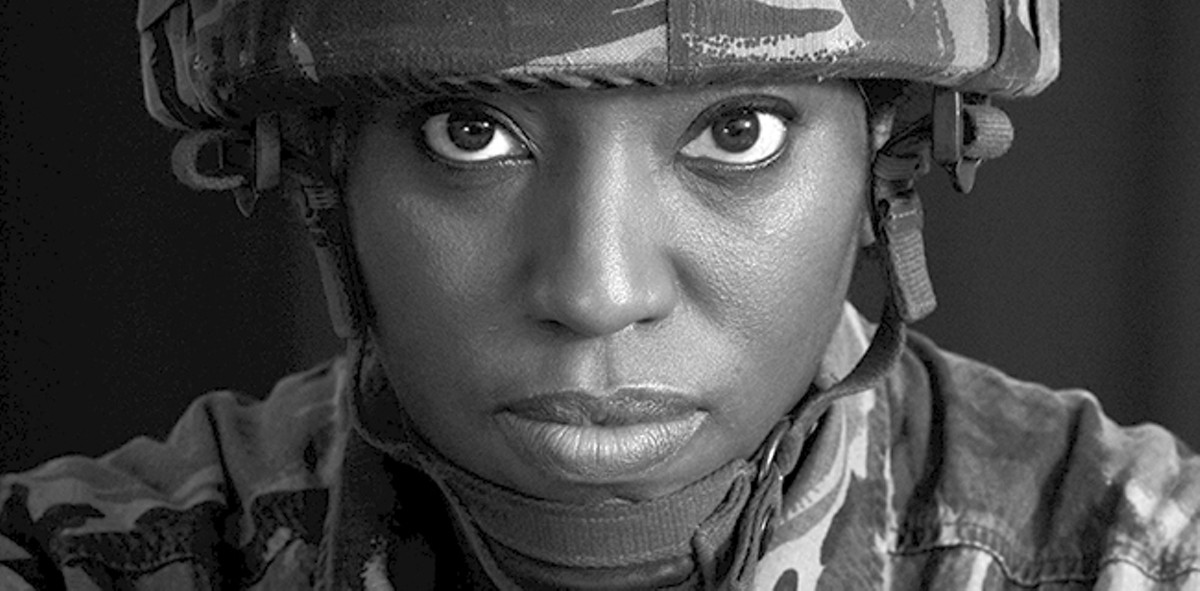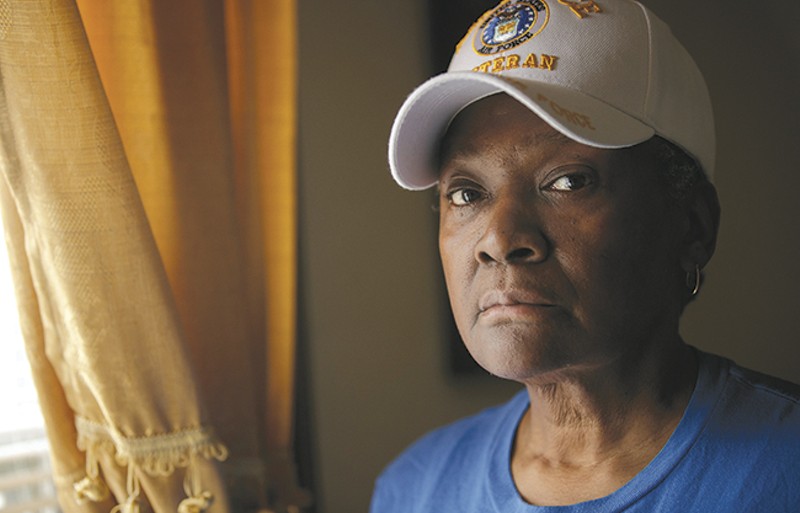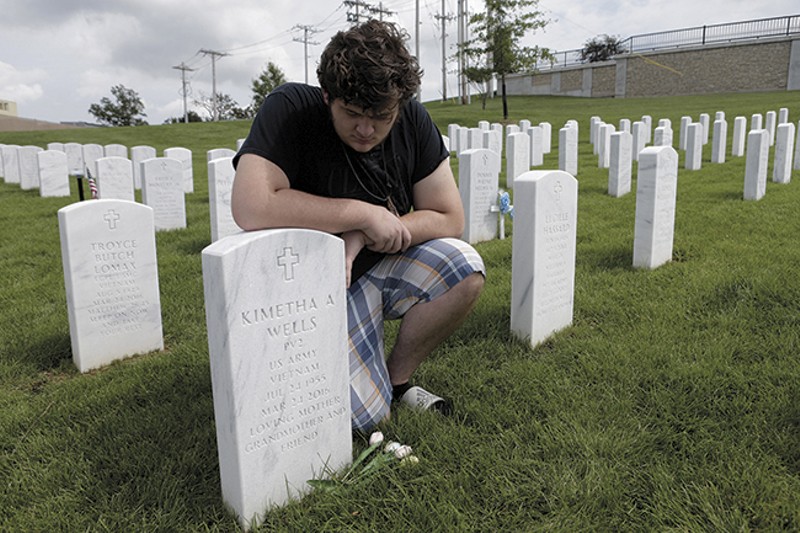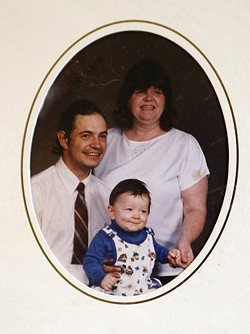Arlene Parker recalls the exact moment her military career went south.
It was the late 1970s, and Parker was an Air Force senior airman stationed at Scott Air Force Base, just outside Belleville, Illinois. Parker was a passenger service specialist, helping military and civilian passengers on and off the jetliners that touched down at Scott. It was a job she loved.
In April 1977, three years after joining the Air Force, Parker boarded a bus full of arriving airline passengers. Her boss, a sergeant, walked up behind her and groped her.
"I turned around and said, 'Hey, don't do that,'" Parker recalls. "Afterward, he came after me... He came after me with a vengeance."
Accused of having a bad attitude, Parker received a series of Article 15s, or non-judicial punishments, for minor infractions. She was demoted, then re-assigned to the Scott rec center. The more she protested, the more her discipline problems worsened, she says.
By year's end, Parker was booted from the Air Force. "I still have an anger problem because of that," says Parker, now 63.
Her anger festered for decades. She couldn't let go of it. What followed were lost jobs, years of drug and alcohol abuse, homelessness and a period of estrangement from her daughter Akilah.
Now 42, Akilah Haynes lives in Ferguson. She was raised mostly by her grandmother, but was in intermittent contact with Parker, who today lives in St. Louis.
Haynes recalls the time in middle school when she made a working TV set as part of a Junior Achievement program. "I was very proud of it," she says. "Well, it wound up disappearing."
Haynes thinks her mother traded the TV set for drugs.
"It hurt me," she says. "I love my mom. My mom is my best friend. She's been off drugs a long time. But you always have that in your head."
Hundreds of thousands of U.S. military members, both current and former active duty, male and female, are believed to have experienced some type of unwanted sexual contact during their service and suffered psychological harm as a result.
A term has been coined to describe what's happened to them: Military Sexual Trauma, or MST. The U.S. Department of Veterans Affairs has defined MST as experiences of sexual assault or repeated, threatening sexual harassment that a veteran experienced during his or her military service. MST covers a wide spectrum of unwanted contact, from sexual innuendo and groping to rape.
Voluminous research suggests that MST can have a lifelong and crippling effect on its victims. What still remains unclear is how MST affects the children of victims.
Kim Dennis, a psychiatrist, specializes in the treatment of trauma and PTSD. She notes that children are "exquisitely sensitive" to their mothers' emotional states.
"And if the mother is living in fear, and making decisions out of a fear-based place — it's impossible for that not to affect her household, the way that she's raising her kids, her relationships with her kids," says Dennis, the owner of SunCloud Health, an outpatient addiction treatment center in Highland Park, Illinois.
Emotionally, children are sponges, Dennis notes.
"So if I'm going home from work full of anxiety, full of hyper-vigilance, full of fear, my kids are going to pick up on that," Dennis says. "Typically, they're not consciously aware, 'Mom's really anxious today and I'm absorbing her anxiety.' It doesn't work like that. But they do pick up on it."
A body of work has emerged regarding how parental PTSD can affect children. Studies show increased rates of anxiety and depression and a greater disposition toward developing PTSD of their own for kids with parents afflicted by PTSD, Dennis said.
On average, fifteen percent of adults exposed to most forms of trauma — such as war or weather disasters — develop symptoms of PTSD. With victims of sexual trauma, however, the PTSD rate is about 30 percent, Dennis says.
The U.S. military's MST epidemic is the focus of intense attention from Pentagon leaders, the U.S. Department of Veterans Affairs and members of Congress, as well as the international community.
In May 2016, Human Rights Watch issued a 128-page report that found that thousands of U.S. troops had lost their military careers after reporting sexual assault.
To make matters worse, they were saddled with discharge papers that prevented them from obtaining jobs and VA benefits — a huge problem for those desperate for counseling, medication for psychological problems, job training and other hurdles arising from their assaults.
Missouri's own Senator Claire McCaskill, a Democrat, has emerged as a major voice in the U.S. Congress in the campaign to overhaul the military's handling of sexual assault cases.
A former Kansas City prosecutor who prosecuted many civilian sexual assault cases, McCaskill has helped pass federal legislation to force unit commanders to accept greater accountability, to provide much more support for military sexual assault victims, and to protect them from retaliation by their peers.
McCaskill calls the military "the perfect environment for a sexual predator because they move around so frequently."
Sexual predators move from base to base, into theaters of operation and out of them.
"And so if you are a sexual predator, you can do the crime, and if the woman doesn't have enough support or feel strong enough to come out of the shadows because of the male-dominated environment," McCaskill says, "you can move on, and maybe you could in fact have a number of victims before you are held accountable."
At Jefferson Barracks National Cemetery in south St. Louis County, a headstone sits on a hill overlooking a far corner of the grounds.
The headstone houses an urn containing the ashes of Kimetha "Kim" Wells, of Belleville.
Wells passed away after suffering a heart attack in March 2016. She was 60.
A year after her passing, her son Ian Boyer describes Wells as a woman who coped with a long list of challenges stemming from the central trauma of her life: In the early 1970s, soon after joining the Army, Wells was raped by a fellow soldier at a training base in Massachusetts. Wells kept it a secret for most of her life, only disclosing it to her children after deciding she could not endure the pain any longer — at least not on her own. Her children needed to know.
When his mother disclosed the rape, it was like all the jumbled bits of a puzzle fell together, says Boyer, now twenty.
"I lived my life wondering why my mom was so different than the other parents, and why she wasn't normal," Boyer explains. "There were just a lot of weird things that she did. It really opened my eyes when I found out what happened."
Boyer visited Jefferson Barracks on March 24, 2017 — the one-year anniversary of his mother's death. He did not cry when he visited the grave site.
"When I went there, I really had the feeling of needing to be stronger for her, really," he says.
In the years before her death, Wells spoke at length about the rape and how it affected so much of her life afterward — a long narrative of challenges and travails marked by drug and alcohol problems, mental health and financial crises, and conflicts with the two sets of children she raised with two different husbands.
But even when her drug and alcohol use were at their worst, her children remained her primary focus, Wells said.
"I always thought about them," Wells said. "They didn't know it, which is why they are always angry. They were always the primary focus, but they didn't think they were."

I first met Kim Wells in December 1999, while working as a reporter for the Belleville News-Democrat. Her second husband, Mike Boyer, had been murdered during a carjacking outside the nightclub where he worked as a security guard. East St. Louis Police had recently arrested his killer.
I had gone to the trailer park in Caseyville, Illinois, where the murder victim's widow — Wells — lived with her two small children, Ian, then two, and his baby sister. I wanted to interview Wells about how her husband's murder had affected her and her family. I remember that I came bearing gifts: a pair of stuffed bears for the kids bought at a nearby Target. And I remember the look in Kim's eyes when I first met her: an oceanic sadness so deep, so pervasive, I began thinking of my own toddler son, who was almost Ian's age. I stifled a sudden urge to begin sobbing.
And yet, when she answered the door and led me into her tiny trailer, the smile Wells pulled together made me feel at home immediately.
¨Hi, Mike," she said in a voice that almost convinced me we'd been friends forever. "Welcome."
Flash-forward thirteen years. By this point I was working as the military affairs reporter for the News-Democrat, and the issue of sexual assault in the U.S. military was starting to generate a lot of headlines. It had become the focus of debate in Congress, even as momentum was building to allow women to take on frontline combat jobs. I wanted to localize this story for our readers. So I contacted a friend who worked with veterans seeking VA benefits. He got me in touch with Wells, who again agreed to an interview.
The years rolled by. I'd work on the story about MST, then put it aside, then work on it again. Other stories got in the way, as well as things in my own life, and my MST story remained on the backburner.
By the summer of 2016, however, I had decided to quit the News-Democrat, but before I left I pounded out my MST story and turned it in to my editors.
It was not to be. The editors said the story had problems and they couldn't publish it in the form I had written it. I accepted their verdict and moved on with my life.
At least that's what I thought. But my unfinished MST story gnawed at me. I began feeling guilty. I knew I owed it to the people I had interviewed, especially the women who had come forward, to finish the story and get it published. Simple decency dictated as much. They had wrestled demons far worse than any I had ever known to tell their stories to the world. The least I could do was serve as a conduit for sharing them.
Wells joined the U.S. Army after a troubled childhood in Elgin, Illinois, and Belleville. She looked back with pride on her brief military career, her son says. But it was cut short by the worst event in her life: She was raped by a sergeant assigned to her training unit at Fort Devens, Massachusetts.
The rape presaged a life of deep troubles. Her first marriage, which began shortly after she enlisted in the Army in the early 1970s, ended in divorce after years of alcohol and drug abuse. Her second marriage ended with her husband's murder outside that nightclub in East St. Louis.
Wells suffered from bipolar disorder and post-traumatic stress disorder. She lived with chronic insomnia, was estranged from the children of her first marriage and exercised often chaotic judgment with her money and the choices of people in her life.
Wells had made a series of benefit claims with the U.S. Department of Veterans Affairs. The claims included hearing loss, bipolar disorder and post-traumatic stress disorder — all of which the VA paid on, according to records I reviewed.
But one claim, for military sexual trauma, or MST, mattered more to her than all the others. That claim centered on the events of one night in October 1974.
After graduating from Belleville Township High School, Wells was eager to begin her military career. After completing Army basic training, she had just arrived at Fort Devens, Massachusetts, located a little over an hour northwest of Boston.
A sergeant assigned to her training company agreed to escort her around the base. She had no reason to feel afraid, because one of the first things she learned in basic training was to trust her fellow soldiers, particularly officers. From the first day of basic training, it was pounded into their heads to place complete confidence in the career sergeants who controlled seemingly every hour of the new recruit's day.
The sergeant guided the car to a deserted air strip. He came to a stop and cut the engine. Then, very calmly, he placed a folding knife on the dashboard.
"'Don't move,'" the sergeant said, according to Wells.
Then he raped her.
The sergeant ordered her not to tell anyone about the rape. Then he dropped her off at her barracks.
"I felt so dirty, so guilty," she would tell me six months before her death, in what would turn out to be her final interview.
Wells recalled spending three hours in the barracks' shower after the rape because she felt too numb to move.
Wells was sent to Fort Devens to learn how to become a Morse Code interceptor. But her classroom problems proved overwhelming because of the emotional trauma resulting from the rape.
"I flunked out of the school because of the assault," she said. "I couldn't concentrate. I started drinking to numb myself out."
One of the hardest parts of dealing with her rape unfolded in the decades that followed, when she would look in the mirror and think of her rapist.
"It bugs the hell out of me. Because now, when I look in the mirror, I'm getting older," she said in that final interview. "To me, he's always going to be in his twenties."
Ian Boyer never knew his father, Mike, who was murdered when he was just a toddler. As he grew up, his mother tried to keep his father's memory alive.
But growing up without a dad, and in the shadow of his mother's erratic behavior, Boyer often felt perplexed.
"When I was a little kid I was always confused," Boyer says. "How she was acting wasn't usual for somebody. We never really had much conversation about it...How I handled it was, I just kept telling myself things are going to turn out better."
Boyer attended a vocational school in Fairview Heights to prepare for a job in computer networking. His mother's VA benefits helped pay his tuition.
Boyer thinks a lot about the good memories that bonded him with his mother. Many of those memories revolve around his junior year at Belleville West, when, thanks to his natural size — six feet, four inches; 275 pounds — he played offensive lineman on the varsity team.
Football allowed a relief valve for the stress and anger of never knowing his slain father, even while his mother suffered from severe emotional problems. "How I express my anger is that anything bad that happens, I build it up inside me... to where I hit harder, I run faster, I'm an-all-out beast... it builds up, it builds up, and just explodes."
For Wells, watching her son play football provided a ray of hope; it opened a doorway to a better world. Midway through his junior year, in the fall of 2014, Wells couldn't conceal her immense pride over her son's athletic success.
"It was wonderful," she said. "It's made me feel good. It's made him feel good. His character has improved. It's just wonderful." Not two years later, she died. Ian Boyer became an orphan at nineteen.
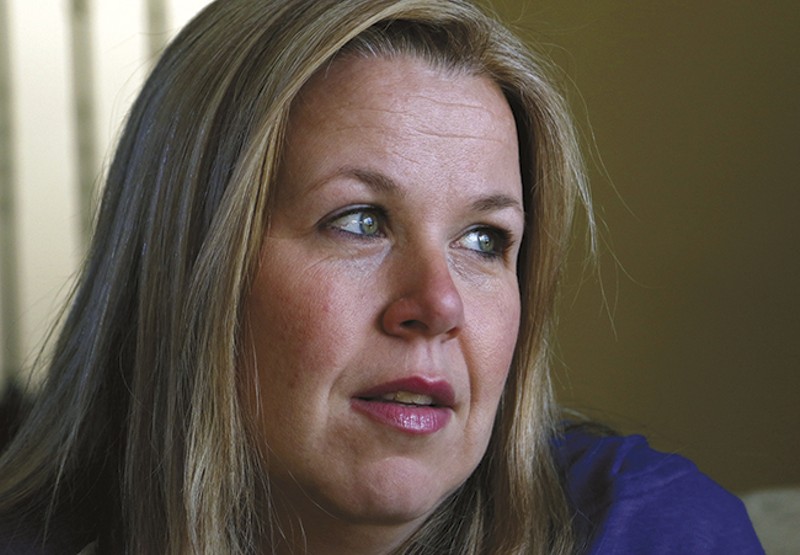
Wells wasn't alone in keeping the story of her sexual assault from her children before finally deciding something had to give. Kimberly Baxter held onto her secret for more than twenty years, even though it gnawed at her relentlessly.
But then, two years ago, while going through a painful divorce, she decided to share with her oldest two children the details of the central event of her life — a trauma that she says has shaped and guided every day since.
So one night, Baxter, 42, who lives just outside Belleville, sat down with her teenage son and daughter.
Finally, after so many years of waiting, Baxter disclosed that she had been raped in the basement stairwell of a Navy recruiting center in downtown Philadelphia.
At the time, in March 1994, Baxter had just graduated from basic training at the Great Lakes Naval Training Center, near Chicago. She was assigned to Philadelphia for temporary recruiting duty. On one of the first mornings of her new assignment, a security guard asked to give her a tour of the building.
"At that point I figured he was just being nice," she says. "I was in my dress blue uniform. Once down there he assaulted me. He tore my uniform. I remember just trying to get away from him. He kept grabbing me."
Baxter reported the attack to her then-boyfriend, a Navy non-commissioned officer, and the security guard was quickly arrested by police.
But police never interviewed her. Baxter never learned what happened to her attacker. She strongly doubts her rapist was ever brought to justice.
Meanwhile, intense flashbacks stemming from the attack made sleep difficult. Baxter found it almost impossible to get through her Navy training program. Her military career was over before it had barely begun.
Today Baxter rarely leaves her house in a subdivision near Belleville. She has received 100 percent disability from the VA. Now off the antidepressant medications she was prescribed for post-traumatic stress disorder, she receives regular counseling for her PTSD. It's helped a lot, she says.
Still, the sexual assault from nearly a quarter-century ago continues to play out in her head. She feels dirty, and overwhelmed by a sense of violation. Often she wakes up in the middle of the night and finds herself crying.
"I think about it pretty much daily. There are things that trigger it more," Baxter says. "Going somewhere by myself. Stairwells, basements, things like that."
The attack even affects the therapy she receives.
"I have had a really hard time with my therapist," she said. "I always told her if I had been smarter, had I done something different..."
For Lauren Baxter, sixteen, learning about her mother's rape helped put into perspective the anxiety and depression her mother has manifested for as long as she can remember. The revelation helps explain so much of their shared lives together — the constant anxiety, the hyper-vigilance, the fears of going out into the world.
"Now it makes sense," says Lauren, the middle child between two brothers, ages twenty and ten. "I want to try to help her, but it's hard."
Lauren, too, finds it difficult to be around crowds. "Sometimes I get freaked out when there are so many people around," she says.
As for the trauma that continues to plague her mother, "I hope it can be fixed," she says. "I hope she can feel safer."
Arlene Parker and her daughter Akilah Haynes have finally reconciled. A lot of healing had to happen first, they say, which was predicated on the acknowledgement of past wrongs. For instance, Parker acknowledged that she might have pawned the TV Akilah made in middle school, even though she can't really remember the incident.
Parker says she's in a much better place these days. Sober for years, she's found a lawyer to represent her VA claims for PTSD and sexual assault, which would allow her to collect financial compensation for the psychological harm she suffered as a result of the abuse. She hopes that she and her daughter can buy a house in Florissant and move in together.
Parker is still angry at what happened to her in the Air Force. But the anger is controllable now, locked away, because she's figured out, she says, what matters more.
"Family is the most important thing," she says.
Mike Fitzgerald is a freelance writer who lives near St. Louis. You can contact him at [email protected].

